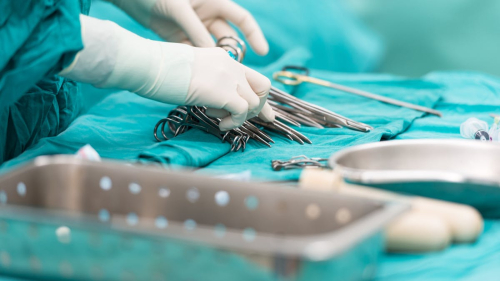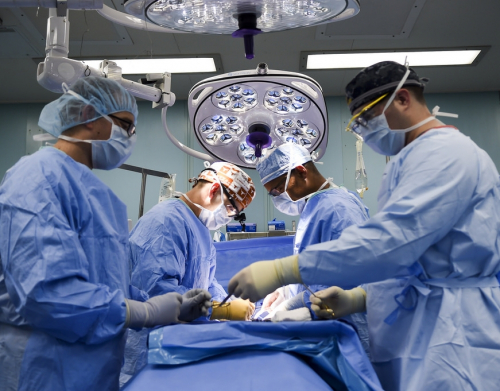Understand The Core Surgical Training Interview
In 2026 the core surgery interview will be held online and lasts 30 minutes with a panel of interviewers asking questions related to clinical and decision-making questions. The interview is designed to assess the selection criteria on the Person Specification with interviewers scoring against these criteria.
The interview consists of one 30-minute interview station with 3 sections completed in the following order:
1. Management question lasting for 10 minutes
2. Clinical scenarios lasting for 10 minutes
3. Portfolio questions lasting 10-minutes
There is no break in between the management and clinical questions and they are asked by the same panel members.
The remote panel is comprised of a maximum of two consultants and there is also a lay representative on the panel whose role is to check for fairness and consistency.
Core surgery interviews will be held online via QPERCOM.
The stations for 2025 Core Surgical Training Interview are:
What To Expect
Upwards of 1200 people are interviewed each year, and you will have the opportunity to pick which date and time slot you want on a first come first serve basis.
The online interview format will mean you need to be even more focused and well-prepared to ensure you stand out and reduce errors.
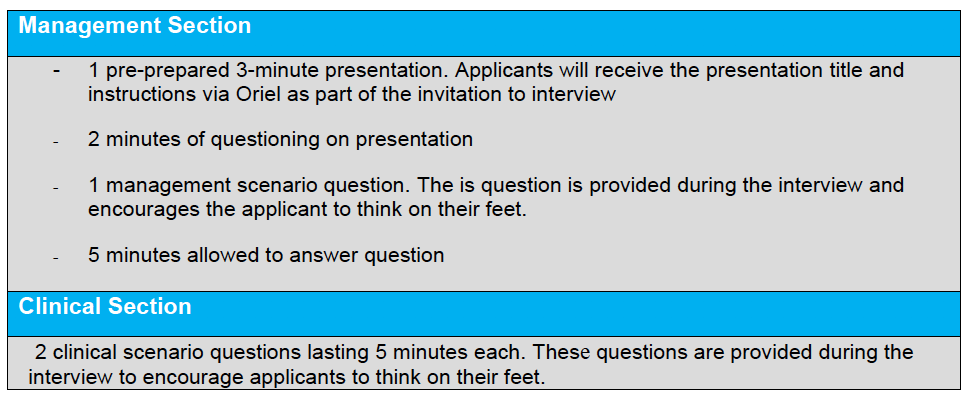
Applicants will need to book an interview slot using their Oriel account. Slots are offered on a
first come first served basis and will need to be booked by the deadline stated in the
invitation to interview. Further information on how to book an interview slot can be found in
Oriel Applicant User Guide: https://www.oriel.nhs.uk/Web/ResourceBank
All interviews will be undertaken online using Qpercom video platform between 24th February to 7th March 2025. The time indicated to you via Oriel is the time you attend the document checking process, please do not try to access the link earlier.
You may need to wait in a virtual lobby until the administrator admits you.
At the time of application submission, you will have agreed to comply with the 2025 Applicant declaration. The Declaration also contains a list of vital steps you must undertake before the
day of the interview.
Interviews will be undertaken through Qpercom video platform using in-built interview
stations with integrated scoring, a new system being piloted by London and Kent, Surrey and Sussex Recruitment Team to provide a positive interview experience for applicants.
Applicants will need to register on the system when prompted by the London and Kent,
Surrey and Sussex Recruitment Team. They can register by clicking on the initial login/forgotten password.
As soon as the interview has been made available by the recruiter,
applicants should see Core Surgical Training Interviews appear on their main page and click
the green button.
Applicants will be taken to a diagnostics tool to ensure they meet the
connectivity and other requirements. Applicants should ensure they test this from the device
they plan to use for their interviews as they may need to source an alternative device to
ensure connectivity. Any applicants unable to connect should contact the recruitment team at
the earliest opportunity. Once they have passed the diagnostics tool, it will take them back
into their waiting area, where they will be met by a member of the admin team on the day of
interviews.
On the day of the interview, each applicant should login and click ‘choose’ 10 minutes prior
to their allocated time. Applicants will be kept in the waiting area where a member of the
recruitment team will meet them to perform ID checks, once this is completed, you will be
advised of your interview stations.
Applicants should ensure that their camera and microphone are turned on and working
correctly prior to joining the call. Interviews will be terminated where the panel cannot see
the applicant.
Before the interview commences, applicants will be briefed on the interview process and will
be required to confirm their identity with the interview administrator. It is therefore important
that applicants have a suitable photographic ID available (passport or UK photo
driving license). In addition, applicants will be required to move their camera to show the
entire room where they are undertaking the interview, to confirm that nobody else is
present.
Once identity has been confirmed, the administrator will advise the interview panel that the
interview process can commence.
The interview must not be recorded by either the applicant, the administrator, or the panel
members.
On completion of the interview, the applicant should terminate their connection to the call
and the interview process is complete.
Changes For 2024/5 Interviews
In 2025 the interviews will be conducted using the QPercom system.
The portfolio station returns in 2025 replacing the scoring attributed to the self-assessment.
Core Surgery Interview Scoring
The core surgery interviews are scored out of a total of 216.
Every station has two interviewers, each of whom will present a stem and a series of questions designed to last five minutes. Seventy two marks are available for each station with a total of 216 marks available overall. It should be noted that there is a cut-off score of 136 marks (or 62%, subject to slight yearly variation guided by statistical analysis), whereby any candidate below this score will not be deemed suitable for core surgical training. Interviewers will score digitally via tablets.
As you can see from the scoring breakdowns below each interviewer scores a certain criteria out of six for the management and clinical stations. A full breakdown of the portfolio station scoring is reflected in the self-assessment scoring system. Scoring systems are mapped against the person specification.
Other marking elements may be used in assessing suitability, such as the modified Angoff method or a weighting being given to the clinical station, and this means that there is no guarantee of success even if the candidate scores a total mark above the cut-off. An example of this might be if the interviewers deem an answer to have shown unsafe practice.
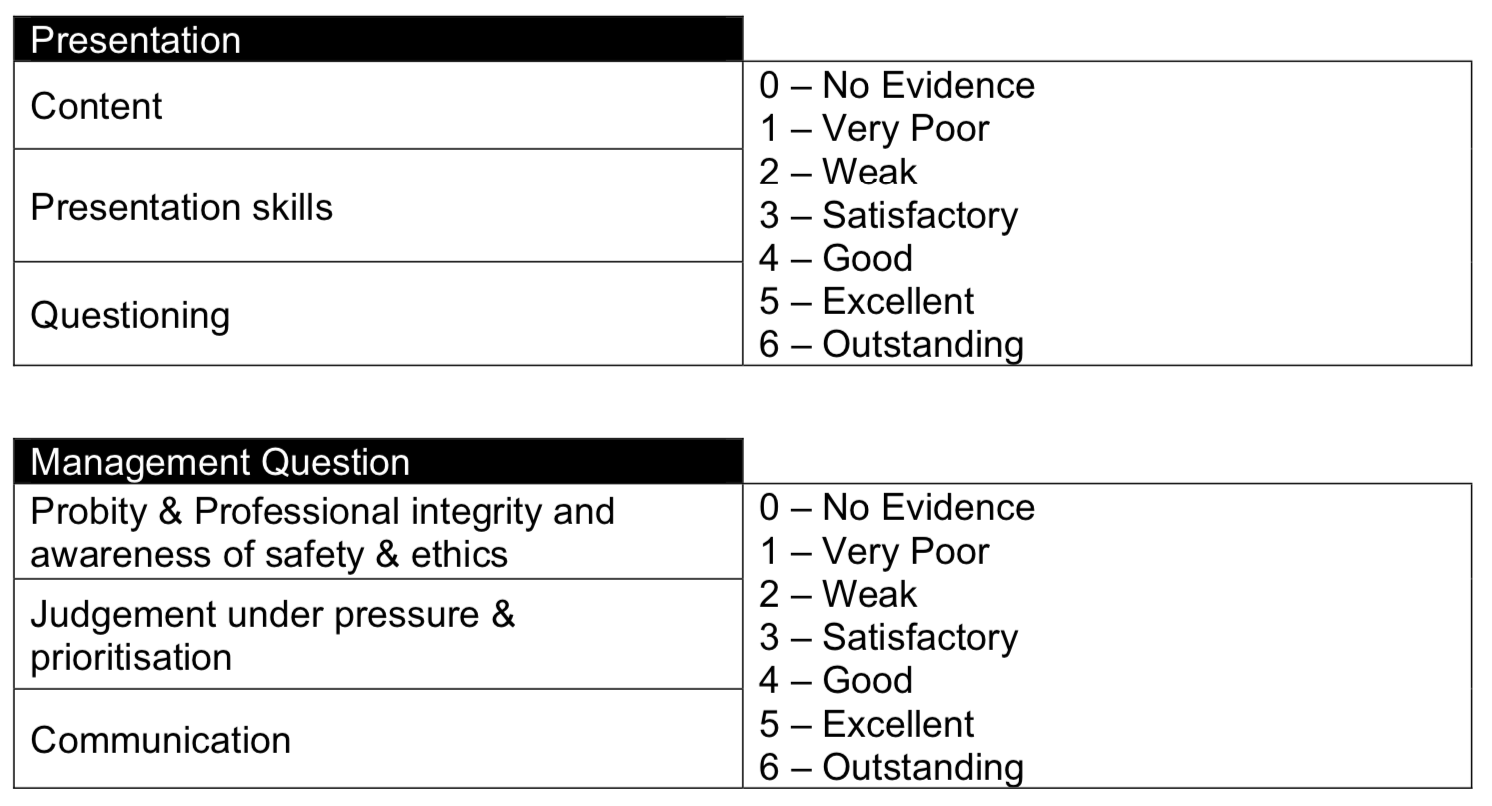
Clinical Station Scoring

Required Documents
The documents required for interview have been reviewed and candidates are now only required to bring the documents detailed below.
In addition to these documents if you have been informed by the London and South East Recruitment Office or the National Recruitment Office that you must provide any other documents then please ensure that you do so.
Blurred or illegible copies cannot be accepted. We do not always have facilities for obtaining copies at the interview venue, so it is important that the evidence is copied before the day.
Essential documents you must bring to your interview:
1. Current passport – You must bring the original document plus 1 copy of the photo/signature page, to be retained. (if you do not have a valid passport please see Appendix 1 below).
2. GMC Registration Printout from the GMC/GDC website - dated no later than 7 days prior to interview – no copy required, not required if not registered.
3. Original evidence of right to work in the UK – You must bring the original plus 1 copy, to be retained. Examples of this include:
- A current passport showing you are a British citizen or a citizen of the UK and colonies having the right of abode in the UK
- A passport or National ID card showing you are a national of the EEA or Switzerland.
- A full list can be found here
If you do not think you will be able to provide the above documents, please contact the London and Kent, Surrey and Sussex Recruitment Office by following the link below.
https://lasepgmdesupport.hee.nhs.uk/support/home
Core Surgery Interview Scoring
The core surgery interviews are scored out of a total of 216.
Every station has two interviewers, each of whom will present a stem and a series of questions designed to last five minutes. Seventy two marks are available for each station with a total of 216 marks available overall. It should be noted that there is a cut-off score of 136 marks (or 62%, subject to slight yearly variation guided by statistical analysis), whereby any candidate below this score will not be deemed suitable for core surgical training. Interviewers will score digitally via tablets.
As you can see from the station scoring breakdowns below each interviewer scores a certain criteria out of six for the management and clinical stations. A full breakdown of the portfolio station scoring is reflected in the self-assessment scoring system. Scoring systems are mapped against the person specification.
Other marking elements may be used in assessing suitability, such as the modified Angoff method or a weighting being given to the clinical station, and this means that there is no guarantee of success even if the candidate scores a total mark above the cut-off. An example of this might be if the interviewers deem an answer to have shown unsafe practice.
Portfolio Station Scoring
Candidates are required to complete a ‘self-assessment’ as part of their application form where they self-score on all the domains that will be assessed in the Portfolio Station. Two panellists will review the evidence provided against the score that the candidate has awarded themselves in their application based on evidence provided in the candidates Portfolio and during the Portfolio Station itself
Management Station Scoring
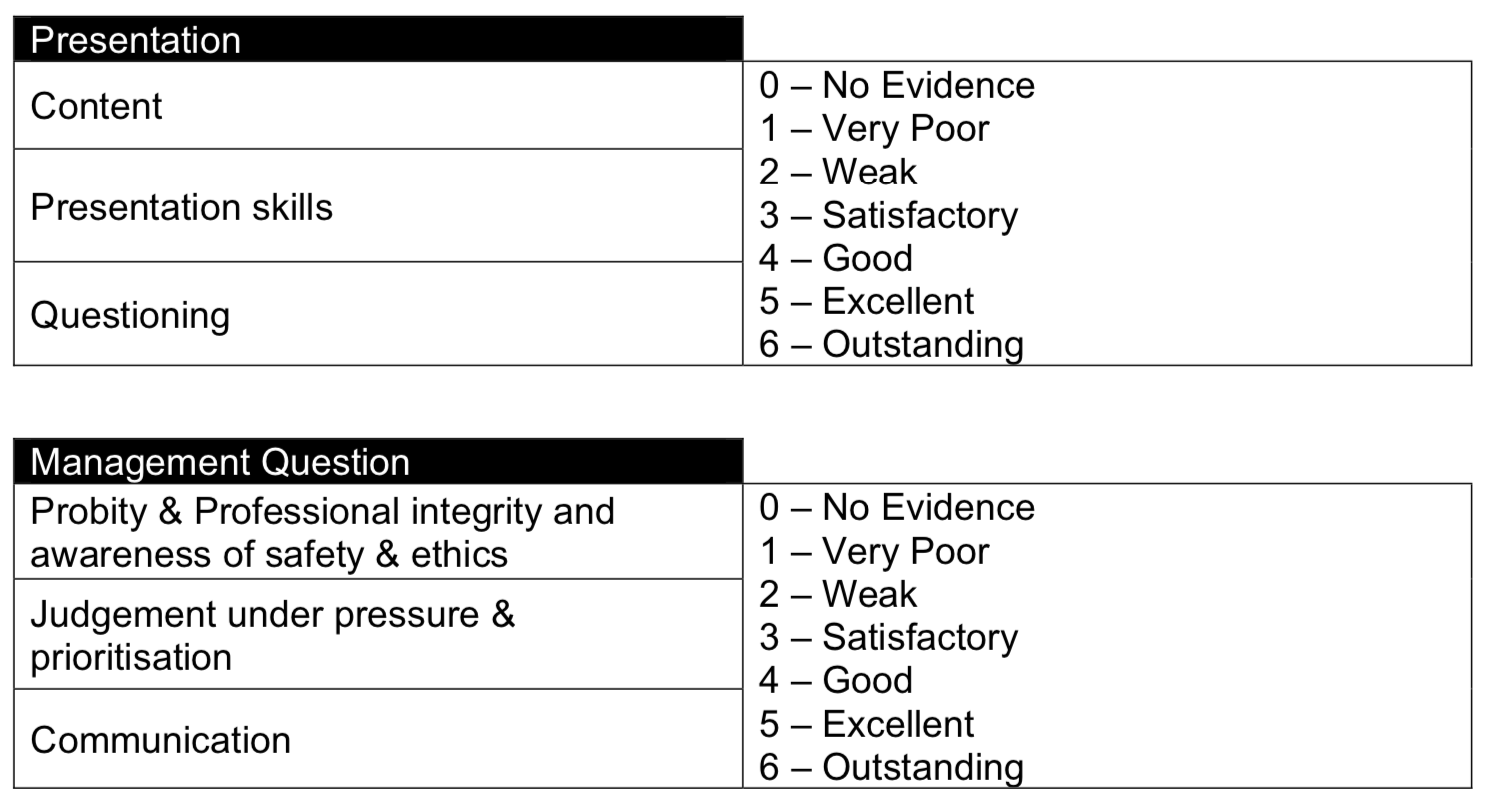
Clinical Station Scoring

Top Tips For The Core Surgery Interviews
- Make sure you have all your documents prepared well in advance and have included and completed the checklist for your portfolio
- On arrival at the interview centre you will be directed to a document checking area and then to a waiting room. A number of parallel interview sessions take place at any one time, so make sure you know which interview circuit you should be attending. At the document check, basic identification details and eligibility for interview will be confirmed. The waiting room will have some refreshments and is a place to relax and prepare mentally.
- Administration staff are available on each circuit and floor to guide you or answer any questions you may have on the day.
- You may receive a short presentation when you arrive to help familiarise yourself with how the selection centre process works.
- Remember to acknowledge lay people who may also be present in the interview room and don't let an extra person put you off
- Give your self plenty of time to get to the selection center – plan your route, check for roadworks/closures, don’t turn up late and stressed
- Dress smart with suits and ties for men and trousers/long skirts and formal tops for women
- Make sure your portfolio is well presented and easy to navigate, invest in a nice binder
- Remember to smile and be personable despite nerves.
- Each station is a fresh start – whether the last station went amazingly or terribly, forget about it as soon as you leave the room and concentrate on the next station

